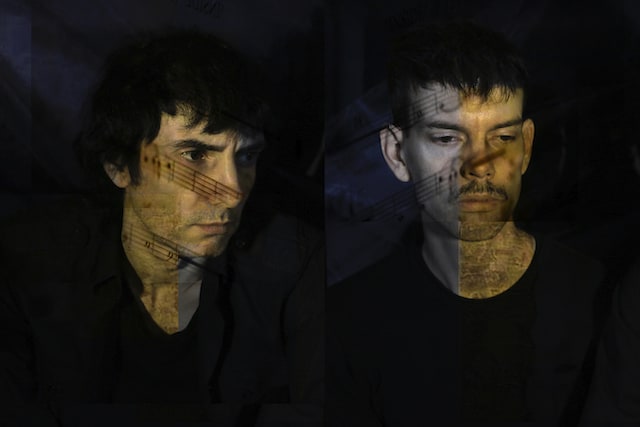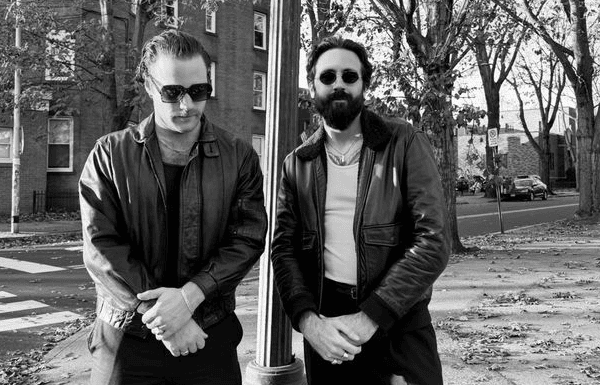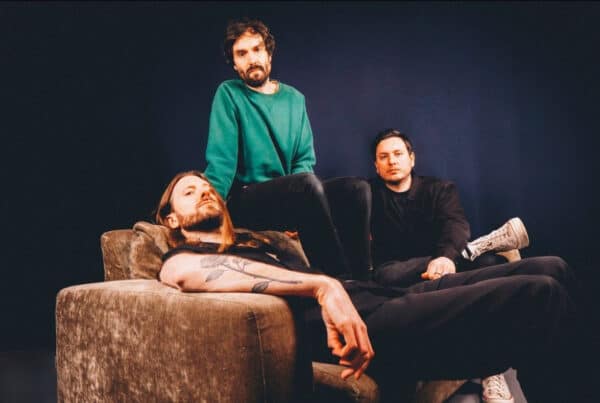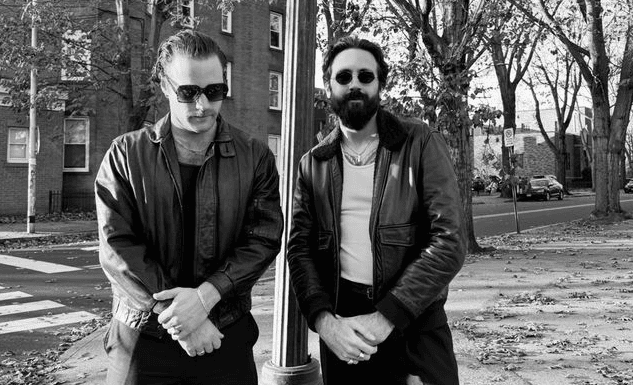For many of us, lockdown has been a retreat into simplicity, a chance to stop the noise and hone in on the underlying truths about who we are, those child-like fundamentals that have driven us to live out our passions in the real, adult world. For Stefan Olsdal, co-pilot of incisive, pop-indebted rock band Placebo, this period of suspension has plucked him from sold-out musical grandstands, and put him back in the place where this all began: his bedroom.

Drowning out the static has allowed Olsdal to bring all of his creative projects into the same orbit. “I’m just trying to enjoy being a bit more insular,” he says. At last, the producer of the rock-infused Hotel Persona; the DJ behind experimental electronic outfit Digital 21; and co-author of Placebo’s legacy, have been brought together in the same room
From those creative outlets – and the precarious state of the world which saw the long-awaited Digital 21 record postponed last minute just as the UK went into its first lockdown in March – came something different: Made for Humans. A collaboration between himself and Miguel Lopez Mora of Digital 21, Made for Humans began as “literally something to keep us sane.” Olsdal explains, “We created that project during lockdown because we felt that we needed some kind of release, and we needed to be able to travel, somehow. It allowed us to explore music that was soothing for the soul. I guess we just let ourselves drift off, you know?”
Pursuing Made for Humans meant Olsdal was coming full circle in more ways than one. He came to the realisation: “In some ways, I don’t think I’ve changed at all. I feel like I’ve just unravelled, peeling away the layers. I was always here. I guess I was just trying to get to me – I was trying to be someone else for a very long time. I’m more ‘me’ now than I was twenty years ago.” He tells of a time before his chance meeting with Brian Molko at the South Kensington tube station in London, 1994, when he spent his days dipping into the electronic soundscapes of Depeche Mode in his room. “I found old recordings of me mugging about, making these really bad Depeche Mode-type sounds,” he shares, “and now, I’ve got a band where I’m making real electronic music of my own. I’ve come back to where I started.”
The seed of Digital 21 and Made for Humans had been planted twenty years before. Olsdal met Miguel Lopez Mora, his counterpart, through the Madrid club scene. “The club was really ingrained in us – we loved it,” he tells us. “It’s a genre of music which is so powerful. The repetitive four-to-the-floor just works, you know?” Their bond was forged not only through the pulse of the dancefloor, but also both already being entrenched in music with their own respective bands. “Starting a new band is never an easy thing,” Olsdal acknowledges. “But we were determined that there was enough substance to continue with. Miguel and I have been doing electronic music for a long time, so when we decided to do something together, we wanted another layer of emotion to it, hence the strings and string quartets. We were excited just to delve into this genre of music and just kind of put our own little spin on it.”
“It’s been an interesting journey for me to start a new band alongside Placebo, which has taken up so much of my life,” he says. The band were unapologetically themselves, holding no bars, censoring nothing; their androgynous appearance, and lyrics discussing their sexuality and mental health carved a different path on the largely unvaried Britpop scene. Together, Olsdal and Brian Molko released seven studio albums – all of which have been chart successes. Placebo was the centripetal force of their careers. “Now, with Made for Humans and Digital 21, it doesn’t feel like I have to keep those projects on the side anymore. It just feels like I’ve got more outlets, and another amazing person to make music with.”
For the past few weeks, Olsdal has been consumed with writing for Made for Humans. “I’ve been completely into that zone,” he tells us. “It just feels like for me, personally, it’s opened the floodgates of inspiration.” The response to their finely-spun debut track ‘Open Forest’, with its gossamer piano, tied together with strings, was incredible given the new direction Made For Humans had taken him in. Its ethereality was an enormous departure for the trance-like works of Digital 21, or the brooding grunge of Placebo.
“We want people to find solace in it,” he explains, “and something to soothe the soul.” Their sound’s fragile quality was created with Lars Von Trier’s Melancholia in mind, drawing inspiration from its haunting, otherworldly qualities. “I think for both of us, myself and Miguel, we needed it as medicine for ourselves. If you create music from a personal place, it becomes universal. We’re all, at the end of the day, made from the same matter. It’s what we feel we need at the moment.” Olsdal pauses, for a moment, before saying, “Music ends up not being yours, after a while.”
Executing Made for Humans live is a far off ambition, especially given the uncertainty that looms over the live music industry in this climate. But for now, Olsdal is setting his sights on bringing Digital 21’s delayed album to life next year. Speaking on the release, he tells us, “We’re just itching to get it out, and make a harder, more club-inspired album than the first one. The success is yet to come with Digital 21, I feel. It’s bubbling. We’re just about becoming fully-fledged in our identity and what we what to say.” Pencil March 2021 in your diaries, he hints.
Another result Olsdal’s creative burst was, at last, going into the studio with Brian Molko to bring to life their eighth studio album. This will be the first in seven years, since their last record, Loud Like Love. The end, he shares, is in sight. Throughout their journey with Placebo, Molko and Olsdal have never once compromised on their artistic vision. “At times, there was a lot of noise and opinions coming our way, but we stuck to our guns,” he says, “and a lot of times we made some enemies and we weren’t popular. At the end of it, we’re the ones who have to live with our own path and artistic choices – that’s not something everyone has to go to bed with. We feel the weight of the responsibility of our work. We tried, as much as we could, our own artistic integrity and what is intrinsically ‘Placebo’.”
Success has been something of a mirage, for Placebo, despite the fact that they would be described as undeniably successful. There is a difference, Olsdal insists. “Well, I’m incredibly grateful for the success that I’ve had, and I don’t take it for granted,” he explains. “But to be honest with you, I didn’t really enjoy it for a very long time because I wasn’t ready for the probing, and the way our lives were constantly exposed from over-touring and everything in the press. I remember thinking at the time, when things were going really well for us, ‘Okay, Stef, you’re not really enjoying this, but just do it – the iron’s hot, strike it. You’ll be grateful for it later.’ So I just stuck with it, and it went through phases.”
He remembers how he and Molko used to dream of playing Brixton Academy, and that when they’d finally made it onto that stage, that would be when they’d finally caught up, they’d finally ‘made it’. “But then we did that,” he says, “and we played Brixton Academy fifteen times, or something – and then you move the goalposts.” He went through a materialistic phase, too, doggedly pursuing that feeling of quantifiable accomplishment. But no matter how much he accumulated, he never replicated that rush. Now, Olsdal has reached something of a conclusion, and it’s far simpler than he’d ever imagined twenty years before: “I’m a musician, and that’s what I’ve always wanted to be since I was twelve, pretty much. I guess now, for me, success is about making music that really satisfies me.”
Success, he believes, isn’t a goal, but following through with your instincts. “Follow what feels right, follow your gut,” he says, “and don’t try to emulate someone else. As soon as you start copying someone else or trying to follow a trend, you will inevitably fall behind.” His advice for aspiring musicians, who played Placebo records in their bedrooms as he once did with his heroes, Depeche Mode, comes down to perseverance. “Stay true to yourself, don’t lose sight of your passion, and stick it out.”
Words: Sophie Walker / Interview: Dom Smith






